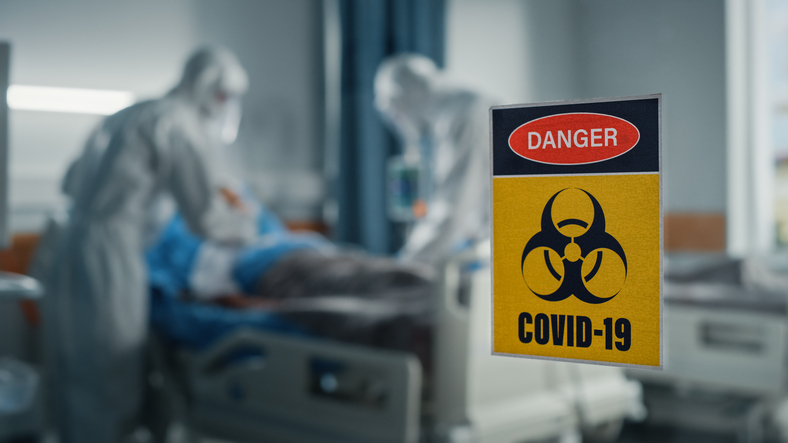While the worst of the COVID-19 pandemic seems to be behind us, the spread of the Delta variant indicates that it’s not completely over yet. During the height of the pandemic, nurses worked on the frontlines all over the country, and some are just now sharing their experiences working in the ER during the height of COVID-19.
Rastisha Smikle, RN, works in an ER at a hospital in central Florida. Having worked as a nurse for more than 10 years, she answered our questions about what it was like in the ER during COVID-19.
As a nurse in the ER in Florida, what has it been like working there during COVID-19? How has it changed over the last year or so?
It was very challenging to work during the pandemic. In the ER, we are a patient’s first point of contact, and because of that, our staff is considered at a higher risk of being exposed to the virus. Although safety and infection control elements have always taken priority in our roles, the unknown factors of the virus’ transmission, ever-changing symptomatology, and treatment contributed to our challenges because of all the unknowns.
Patients were more fearful than ever; they often came in anxiety-ridden wanting testing because of recent exposures, which added additional challenges because the critical emergencies also relied on our care.
In some ways, things have gotten better. As we have learned more about the virus and therapeutic treatments, patients are being cared for more efficiently so that they can recover at home. Unfortunately, hospitals nationwide are busier than ever right now. The volume that we are seeing is higher now than we saw during the pandemic. It’s tough to say what that is.
Did your duties change during COVID-19?
My duties didn’t change per se, but the way we cared for patients did.
Before the pandemic, PPE like N-95 masks were not permanently a part of my uniform. Now, I wear an N-95 and face shield with every patient encounter. Because of the wide range of symptoms, we have to be extra diligent in caring for patients just in case they have the virus and aren’t aware of it yet. In addition, minimizing my exposure time with known Covid-19 patients is also an element that I have had to implement in my care. For the safety of myself and the other patients, swift patient care must be implemented with these patients when appropriate.
Employing the use of hospital phones has been a way that I try to fill in the gap. Throughout this time, I have learned how fearful patients are after they get the diagnosis. With these talks, I can extend some reassurance, listen to their concerns, and figure out thoughtful and effective ways to help them with the emotional challenges that often accompany the diagnosis and isolation.
Was it scary to work there in the beginning of the pandemic? Why?
There was a level of fear when it came to the unknowns. I had worries about getting the virus. But primarily because of my level of exposure in the ER, I was mainly concerned about others being around me. I isolated myself from family and friends, and my life was work and home.
There were times when we would care for patients with no known symptoms and later, we’d find out that they were positive for Covid-19. I would have mounting thoughts of whether I wore the correct PPE or if I was exposed in those moments.
We also had staff members contract the virus, which was scary. Thankfully, most of them recovered well, but seeing how careful other staff members were and finding out that they still contracted the virus was nerve-wracking. Every minor allergy symptom or cough would cause concern and anxiety about whether I was next. To combat those fears, I had to reshape my focus. Instead of being hyper-focused on getting sick, I began to fix my focus on doing my job well and providing the optimal patient care that I was used to. With this newfound focus, my anxieties slowly began to dissipate.
How do you keep yourself from bringing the stress of the job home? What do you do to relieve your stress?
Sometimes it can be challenging, especially after losing a patient. My go-to stress reliever is prayer. I have a solid spiritual foundation, and thankfully the organization I work for also provides spiritual support, if needed. As nurses, we are fortunate enough to work three shifts per week. I try not to take my days off for granted; I use that time to refuel. Therapy, exercise, and self-care activities have been essential to my mental well-being.
What are the biggest challenges of your job—especially during COVID-19?
One of the biggest challenges of my job is knowing that I have to be on my A-game at all times because the safety of myself and others depends on it. The unknowns that came along with COVID-19 made it challenging to do and be our best. For example, we didn’t always know the best course of action when treating some patients because everyone would respond so differently, which posed one of the biggest challenges. Thankfully, as time went on, we learned more about the virus, the treatment options that worked for others, and we eventually adapted very well.
What have been your greatest rewards during this time?
My greatest rewards have been seeing how the nursing and healthcare community banded together during the most challenging times. The support from our community members was also very inspiring. We often came into work with goodies from companies that wanted to encourage and thank us for our continued work.
- What an MSN Can Do for You - October 18, 2023
- The National League for Nursing: Connecting the Academic and Clinical Worlds for 130 Years - August 16, 2023
- Treating Burnout, Trauma, and Grief with Dance - July 14, 2023



